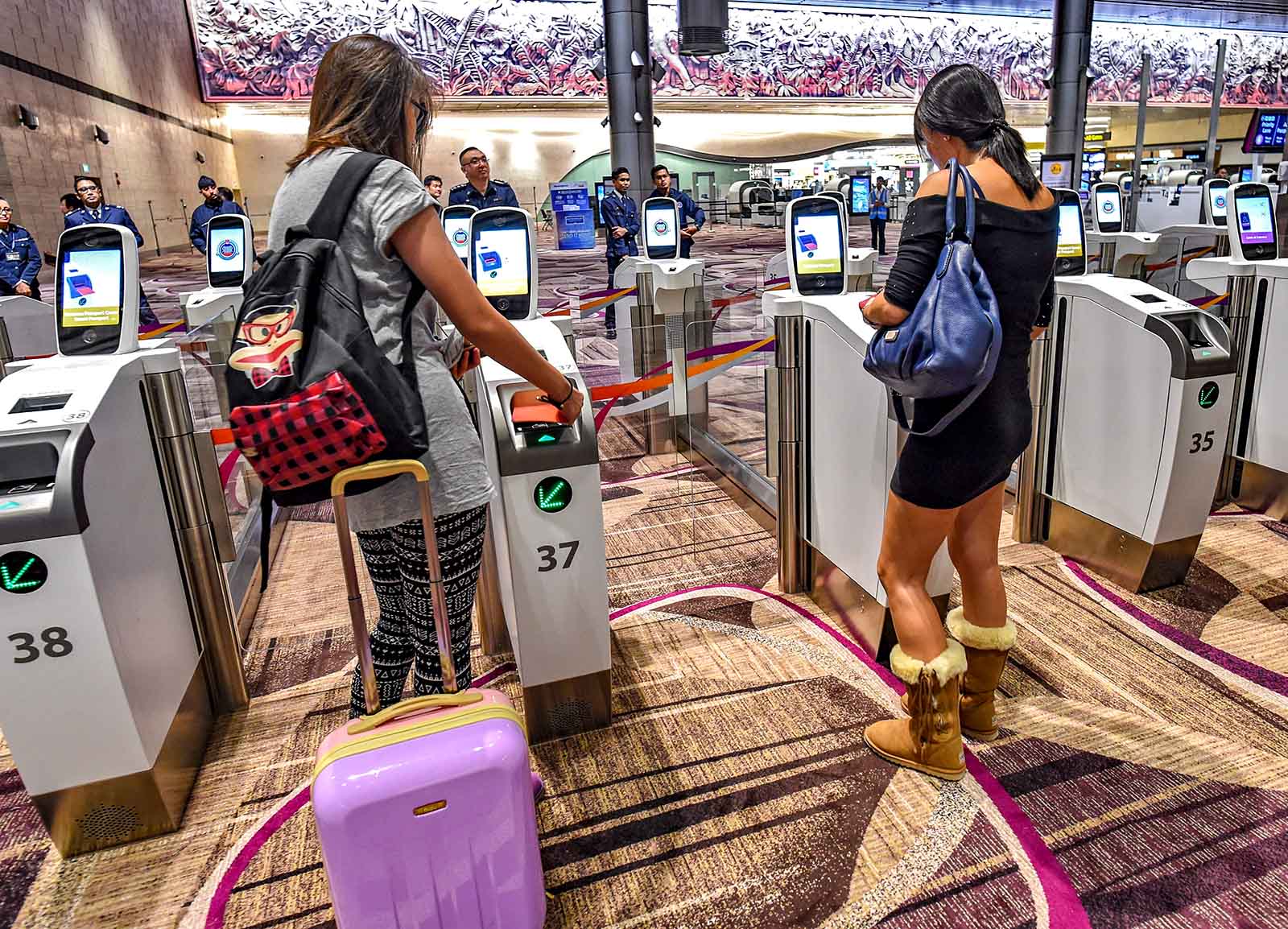Humans Are Bad at Innovation. Can AI Change That?

Passengers scan their passports at the gates of a new, automated airport in Singapore. Automation and AI may soon free people to tackle the social aspects of commerce and innovation.
Photo: Roslan Rahman/AFP/Getty Images
This is the second article in a weeklong series about artificial intelligence. The first installment can be read here.
One activity humans should be exceptionally good at is innovation. Being able to conceive of new ways to shape the material world to our advantage is what differentiates us from animals. Yet, surprisingly, while humans are great at creating ideas, they are extremely poor managers of the social processes that create stellar new projects.
Given that we are surrounded by breakthrough technology, such as electricity, automobiles, various forms of breakthrough medicine, 3D printing and nanotechnology, how can we possibly be bad at innovation?
It’s helpful to look at how we arrived here. Looking back at some of the seminal business works of the 1980s, there are close parallels between what was written then—messages imploring firms to become less hierarchical, more iterative and social—and management advice written today.
Take these few points from Peters and Waterman’s In Search of Excellence (1982):
Quick decision-making and problem solving to avoid bureaucratic control; close to the customer—learning from the people served by the business; autonomy and entrepreneurship, fostering innovation and nurturing “champions”; employees as a source of quality; hands-on, value-driven, management philosophy that guides everyday practice.
These ideas are a pretty good fit for our present-day, web-inspired, “network of relationships” business climate. And yet, we’re still not doing these things.
But now, a moment of profound change is upon us: the switch from technological drivers of change to human and social drivers.
Today’s breakthroughs are more social than they are technological: Platform businesses are a new model for wealth-creation based around online meeting places. Blockchain originates in online user groups; cryptocurrencies have a similar genesis. There are numerous business ecosystems or agglomerations of human activity that are loosely connected but somehow (and we really don’t always know how) symbiotic. These innovations are all points of social interaction.
And that’s where I started. We are not very good at this new form of innovation. After all, we have been trying it since at least 1982.
What are the implications of this shift? And what is the potential role of AI in making us better at social work?
Some Caveats
Before giving an answer, it would be foolish not to introduce a caveat or two. This answer will focus primarily on the U.S. and Europe. In these regions, decision-making and value creation is often blocked by hierarchy, traditional roles and processes, as well as accounting practices.
In Asia, the picture is different. Some Asian companies have long had more patience for the complex nature of human relationships in sustaining wealth-creating activities.
One of the most sensible uses of AI is to replace human intervention in innovation so that we can focus more on reconstructing the social elements of work.
In contrast, while we know that a money-making impetus is strong enough in China to support sometimes brutal working conditions, the other side of Chinese business culture is that it is profoundly social. People do business with people they know, people who are friends. Online Chinese networks are alive with relationship-building and gifting.
In my book, Platform, Disruption, Wave, I suggested that the new social arrangements of commerce—business platforms and ecosystems—orient economic advantage toward extreme scale. In a highly scaled commercial landscape, China has a distinct advantage because of its internal market and immediate sphere of influence. I think the social nature of business adds to this Chinese wave.
The Role of AI
In my view, one of the most sensible uses of AI for the West is to replace human intervention in innovation so that we can focus more on reconstructing the social elements of work.
It is already happening to a certain degree. At one firm, van-fleet utilization data is used to determine when a fleet manager should preemptively pull vehicles from the road for servicing. The goal is to maximize the lifetime value of the van. But if you ask what is going on here, you see there is very little other than a marginal improvement in the cost-base of current work practices.
One of the best AI applications out there reduces the number of false alerts on credit card fraud, thus improving the credibility of all other alerts. But maybe the system change we need is no cards, not better detection of fraud on existing ones.
We do not ask the right questions of AI. In these situations the application is too far downstream. Does a firm really need an enormous fleet of vehicles in the age of the drone? Should we really be using cards at all when digital wallets are far better forms of personal financial management? Instead of using AI to optimize current systems, we should be thinking about system-level innovation and then automating whatever processes are necessary to get system-level innovation firing.
An intelligent machine would prioritize these upstream gains; a human would not. Humans are prone to enroll in new cults and their rituals, one being Silicon Valley and its desire to change the world regardless of the consequences. But there are other sects around us.
The cancer-breakthrough-cure sect is a branch of medicine that has been busy persuading us that a cure is imminent, if only for the want of a lot more funding, since about 1970. Cancer cures are always on a promising line of inquiry, close to the brink. It is an irrationally monolithic business that machine intelligence could disrupt at the paradigmatic level by validating the need for more diversity in research. Humans will never do this. They are welded to their paradigms by far too many bonds.
In my own sphere of interest—platform business—people are wedded to the idea of network effects. There is an absurd belief that exponential scale is there for any of us to inherit because we can rely on (and manipulate or build) network effects. In reality, network effects are as rare as black swans.
The human approach to innovation, though, has become a race to consensus: Silicon Valley is where the gods of good innovation lie; genetics or immunotherapy will cure cancer; network effects will give us exponential growth. We need AI that will engage us in the critical debates about these chronically unchallenged ideas.
The AI in Work
So here are my predictions and perhaps also wishes for AI.
AI will take the decision-making out of innovation. They will take data of usage (of objects, sites, assets) and, taking social data, compute a variety of market segmentations that need to be served by more highly differentiated products, at reasonable cost. They will do the product-market fit calculations, specify the product and ask us to get on with it.
Humans will need to focus on creating good conditions for social interaction. Machines want us to innovate more, as do we as customers. So we need to do more, and the only way to accelerate our activities is by working more closely, building more relationships and being on teams that care about value. We describe how work must become more social and interactive and how the social dimension facilitates business agility.
AI will present us with powerful alternative views of how to function in different markets. The combination will be a mix of AI that can do good upstream value discovery and can help search for patterns in the interactions of human beings that are tasked with executing a vast matrix of innovation. AIs will spot the micro-opportunities in emerging segments and will free people to improve their skills in interaction and relationship building.
Machines will be the systems thinkers that spot the patterns of weakness and the repetitive near-misses in our actions and help us refine human systems so that we get delivery right. They will be part of the team, the smartest part, supporting us like friends were always meant to.






